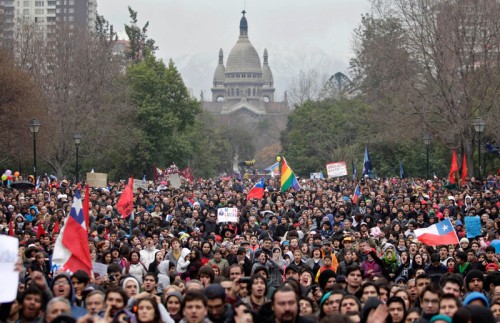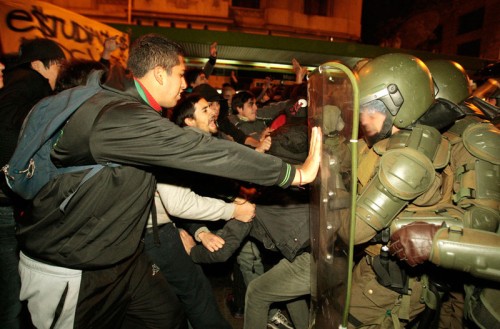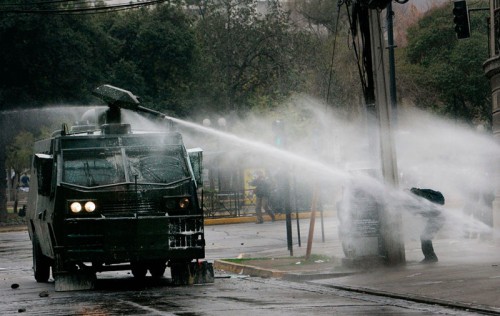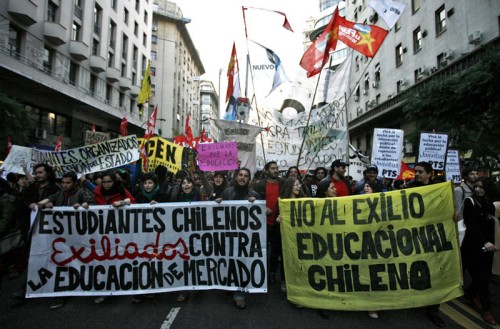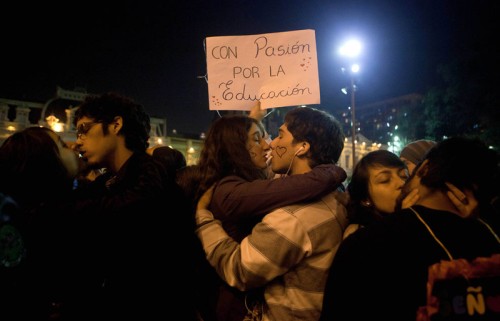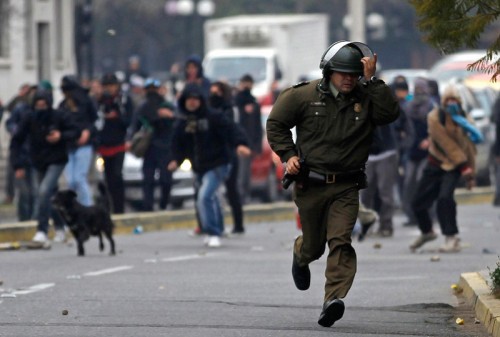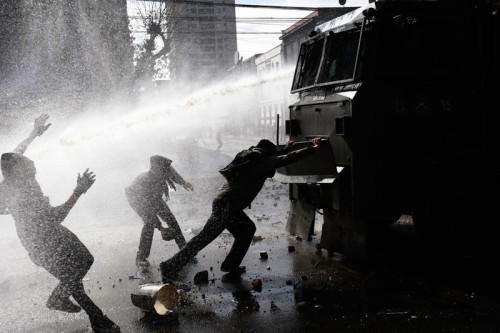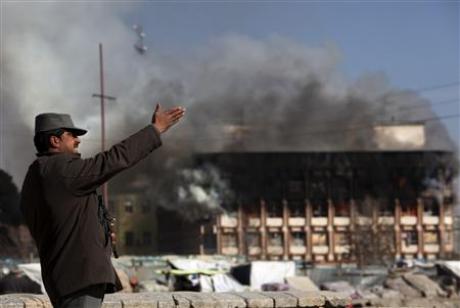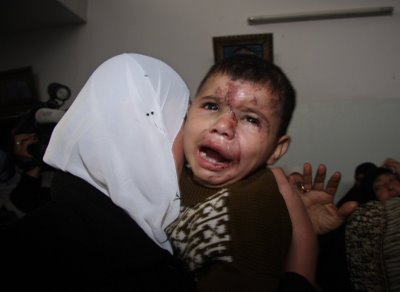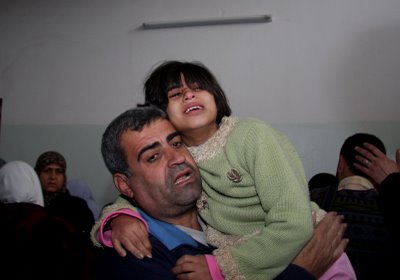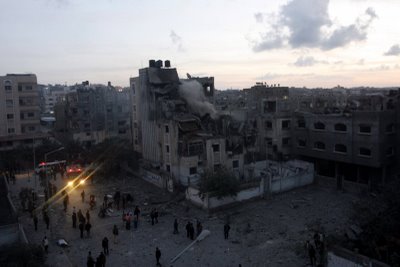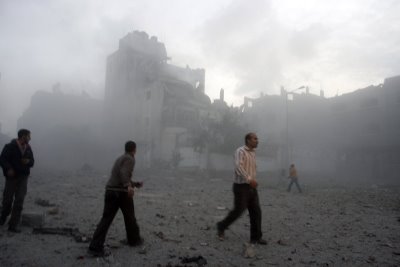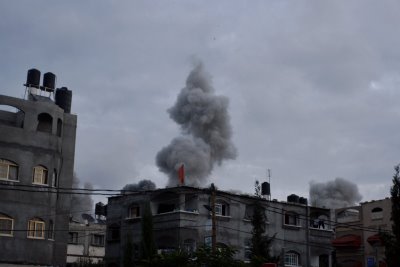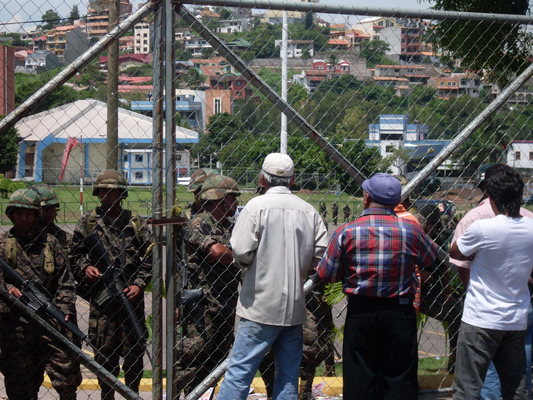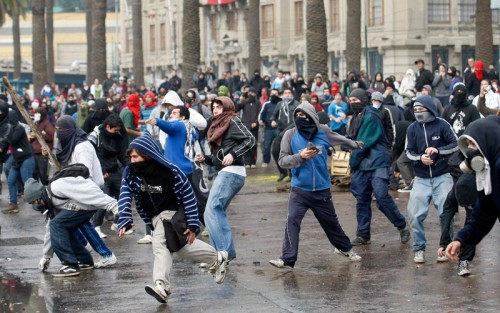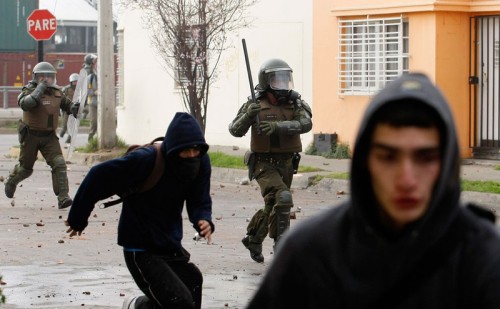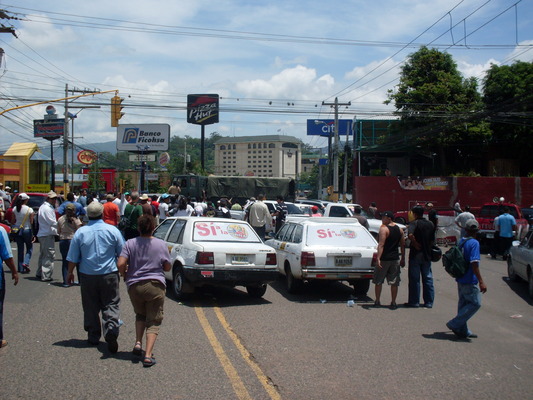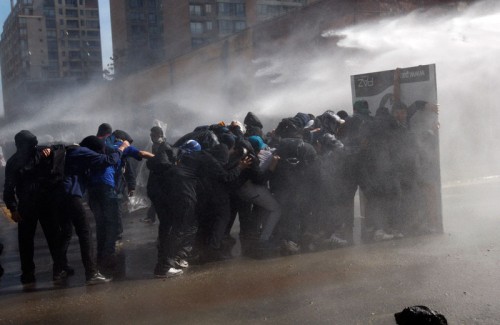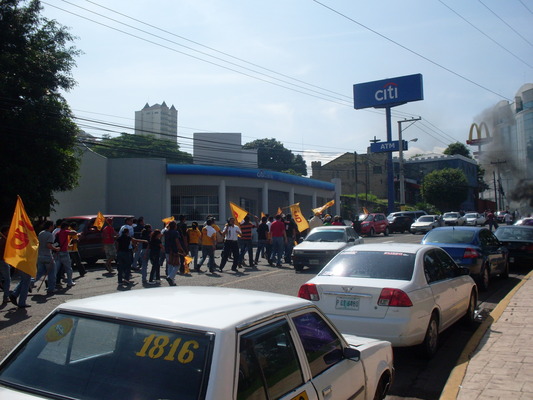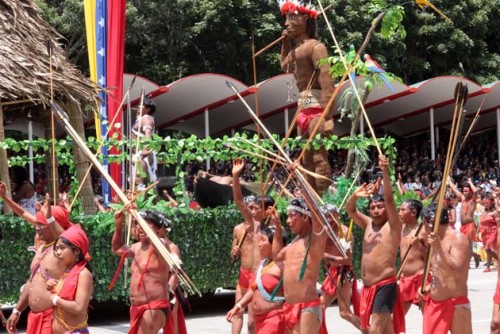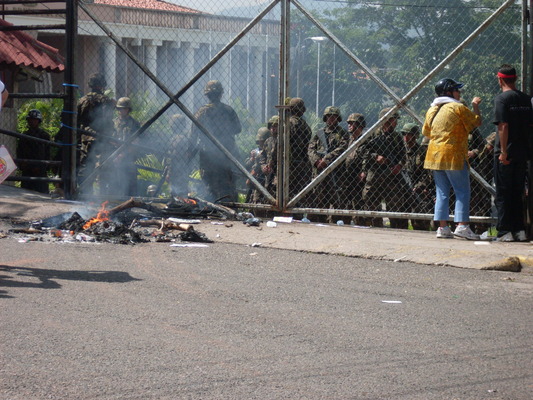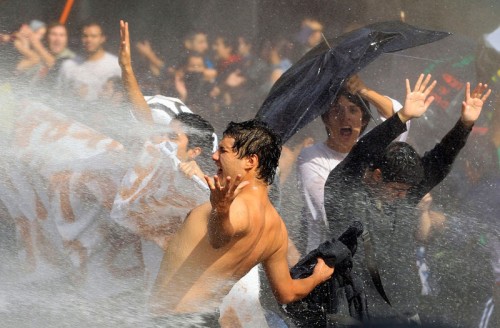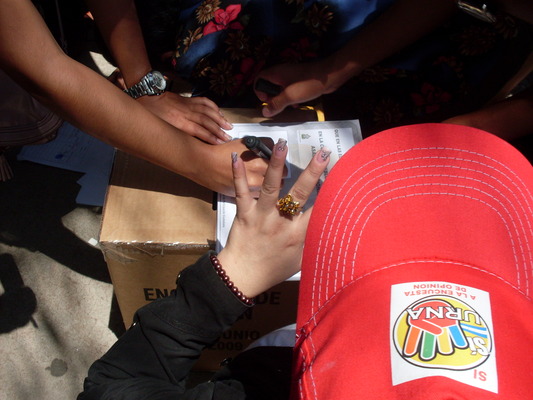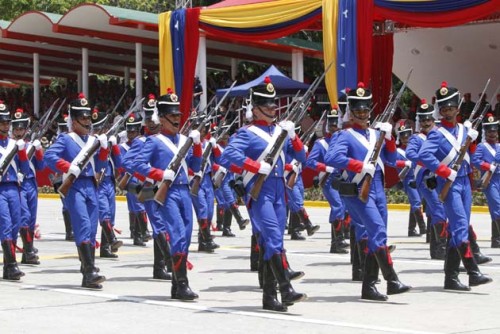Chilean Student Movement Leads Uprising For Transformation of the Country (Includes Photo Essay)
By Roger Burbach (first article). Author and photos of second article are not identified.
Global Alternatives (article). Espiya (photo essay)
New America Media
By August 13, 2011
Chile is becoming a part of the global movement of youth that is transforming the world bit by bit—the Arab Spring, the sit-ins and demonstrations in the Spanish plazas, and the rebellion of youth in London.
Weeks of demonstrations and strikes by Chilean students came to a head August 9, as an estimated 100,000 people poured into the streets of Santiago. Joined by professors and educators, they were demanding a free education for all, from the primary school level to the university.
In the riotous confrontations that took place between bands of youth and the police, tear gas canisters were fired into the crowds, and 273 people were arrested. Later on, in the cool winter evening, the deafening noise of people banging on their pots and pans in support of the students could be heard throughout Santiago, the country's capital city of six million.
Under the 17-year dictatorship of Augusto Pinochet, much of Chile's educational system was privatized, and even after he left power in 1990, private education continued to prevail. Today, 70 percent of university students attend private institutions. Private education is sustained by the constitution drawn up during the Pinochet regime, and educational entrepreneurs capitalized on it.
Camila Vallejo, the elected president of the Student Federation of the University of Chile and one of the main leaders of the national protests, proclaims: “We need quality education for everyone. It is a right. Chilean society cannot move forward without it.”
Twenty students from the secondary schools are currently on a hunger strike and are willing to forego the academic year, even die for the cause.
Alina Gonzales, a 16-year-old participant in the secondary school strike, told NAM: “We will do what it takes to change this system and our lives.”
The students are part of a broader movement that is calling for the transformation of Chile. In recent months, copper mine workers have gone on strike, massive mobilizations have taken place to stop the construction of a huge complex of dam and energy projects in the Bio Bio region of southern Chile, gay rights and feminist activists have marched in the streets, and the Mapuche indigenous peoples have continued to demand the restoration of their ancestral lands.
Faced with the intransigence of the conservative government of billionaire President Sebastian Pinera, the movement is calling for a national plebiscite. Camila Vallejo, who is also a member of the Communist youth organization, asserts, “If the government is not capable of responding to us, we will have to demand another non-institutional solution: the convocation of a plebiscite so that the citizens can decide on the educational future of the country.”
Forty-two social organizations grouped together under the banner “Democracy for Chile” have rallied to back the student movement. Their manifesto proclaims: “The economic, social and political system is in a profound crisis that has compelled the communities to mobilize … An unprecedented and historic movement of citizens is questioning the bases of the economic and political order that were imposed in 1980” by the Pinochet constitution.
Picking up on the students’ call for a referendum, the manifesto argues that it should be “multi-thematic” and allow voters to decide whether to convene a constituent assembly that would have the power to draft a new constitution.
In recent years, there has been a growing call for an end to the neo-liberal order and the attendant political system that concentrates power in the hands of a political elite. As in Ecuador, Bolivia and Venezuela, there is a movement to reshape the nation with a constitution that allows for popular participation at all levels of government. Fundamental rights would be recognized, including the right to a free education, health care, culture, and the right to choose one's sexual orientation.
President Pinera refuses to endorse the call for a plebiscite. His approval rating now stands at 26 percent. The day after the massive demonstrations, he signed a token law calling for “quality education.” He denounced supporters of universal free education, arguing that it would represent a transfer of wealth to the privileged since “the poor would pay taxes that benefit the more fortunate” who attend the universities.
Chile is at a crossroads. In the two decades since the fall of the dictatorship, many Chileans have succumbed to consumerism, as shopping malls and credit cards have proliferated with the “Chilean Economic Miracle” that has seen annual growth rates of 6 percent. But many Chileans want a more meaningful society. They recall the Chilean tradition of democratic socialism that was snuffed out with the overthrow of President Salvador Allende on September 11, 1973.
New mobilizations are planned in the coming week, including a one-day national strike. The call has also gone out for similar demonstrations in other Latin American countries.
© 2007- 2011 CENSA: Center for the Study of the Americas 2288 Fulton St., Suite 103, Berkeley, CA
Source: Global Alternatives
Photos and following comment added by Axis of Logic
Source: Espiya
For the past several months, students, teachers, and their supporters in Chile have been staging demonstrations against their government. Their goal is to transform the country's education system. In particular, they're seeking a referendum to significantly increase the funding and quality of public schools. Students have engaged in multiple forms of protest, from hunger strikes and sit-ins to marches and pillow fights. Smaller groups of protesters have engaged riot police directly, hurling stones and firebombs. Chilean authorities have responded by banning demonstrations, pushing protesters back with water cannons, and offering education proposals that have been rejected. Students in the tens of thousands -- with popular backing across Chile -- continue to march without official permission, and public sentiment against president Sebastian Piñera continues to grow. Collected here are some scenes from the streets of Chile over the past few months.
|
|
| People march during a protest by students demanding access to free quality public education in Santiago, Chile, on August 7, 2011. |
|
|
| Students scuffle with riot police outside the Education Minister in Santiago, Chile, Tuesday, July 5, 2011. |
|
|
| Riot policemen use a water cannon on student protesters during a rally to demand changes in the public state education system in Santiago, on August 4, 2011. |
|
|
| Argentine and Chilean students march to the Chilean Consulate in Buenos Aires, on August 5, 2011, repudiating the police repression against Chilean students during demonstrations in Santiago de Chile. |
|
|
| Couples show their "passion for education," by sharing a kiss during a gathering of over 500 students in the Plaza de Armas in Santiago, Chile, on July 6, 2011 |
|
|
| A police officer runs from hooded protestors throwing stones during student demonstrations in Santiago, Chile, on August 4, 2011. |
|
|
| Demonstrators try to stop a police vehicle armed with a water cannon, during clashes with riot police near the Chilean Congress where President Sebastian Pinera was delivering his State of the Nation address to the National Congress in Valparaiso, Chile, on May 21, 2011. |
|
|
| Students and dogs are hit by a water cannon during a rally to demand changes in the public state education system in Santiago, on July 28, 2011. |
|
|
| Students strike pots and pans during an anti-government rally to demand changes in the public state education system in Valparaiso, Chile, on August 9, 2011. |
|
|
| Students shout during a protest against the government entitled "Mass suicide by education" in Valparaiso, Chile, on June 28, 2011. Students lay down in protest in the streets of the city, demanding changes be made to the state education system. |
|
|
| A firefighter tries to extinguish a fire engulfing a department store building during a rally in Santiago August 4, 2011. Students had organized the rally to demand changes in the public state education system. Reuters could not confirm whether the fire was started by the protesters. |
|
|
| Riot policemen stand guard during a student rally to demand changes in the public state education system in Santiago, on August 9, 2011. The graffiti reads "Chile, you do everything for profit". |
|
|
| A student is detained by riot police during to demand changes in the public state education system in Santiago, on August 4, 2011. |
|
|
| Masked demonstrators stand near a burning barricade in downtown Santiago during rioting after a students protest on August 9, 2011. |
|
|
| Students throw stones during a protest against the government to demand changes in the public state education system in Valparaiso, on August 9, 2011. |
|
|
| Riot police run after students during an anti-government rally in Valparaiso, on August 9, 2011. |
|
|
| Students dressed as superheroes protest against the government in Santiago, on July 18, 2011. |
|
|
| Students throw stones at a riot police vehicle, which was set alight by a molotov cocktail, during an anti-government rally in Valparaiso, on August 9, 2011. |
|
|
| Demonstrators take cover from a jet of water during a student protest in Santiago, on August 9, 2011. |
|
|
| A masked demonstrator stands near an overturned car set on fire during riots after a student protest in Santiago, on Tuesday, August 9, 2011. |
|
|
| Students protest in front of and on the roof of a riot police vehicle, which has been vandalized with paint, during an anti-government rally in Valparaiso, on August 4, 2011. |
|
|
| A demonstrator is arrested by riot policemen during a students' rally to demand changes in the public state education system in Santiago, on August 9, 2011. |
|
|
| Chilean students confront riot police as they are sprayed with a water cannon during a demonstration in downtown Santiago, Chile, on May 12, 2011. |
|
|
| Students throw stones during a protest against the government to demand changes in the public state education system in Valparaiso, on August 9, 2011. |
|
|
| A demonstrator, after being arrested during a student rally in Santiago, Chile, on August 9, 2011. |
Photographer(s) - Unidentified.
